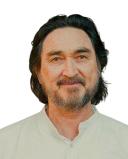
Can going through cancer together bring love to fruition? Shortly before he died my friend Soh wrote these words: “All that remains is gratitude.” He was 71 years old and was referring to his 44 years together with his wife Chio who had died just months before him at 65 in the same hospice in Tokyo.
Soh learned about gratitude caring for Chio through the final stages of her life after she had been diagnosed with lung cancer. He became her caretaker, dedicating his life to helping her battle her illness. But his task became infinitely more trying when he was diagnosed with stomach cancer the following year. Although he had expected to outlive her, suddenly he was concerned whether he would be able to care for her until the end. Soh became both caretaker and fellow traveler, following along as Chio moved through stages of cancer, facing each challenge before he did. She became his teacher of living and dying.
In the midst of his great sorrow following her passing, Soh discovered a journal that Chio had been writing and read it for the first time. He was uplifted from a feeling of complete exhaustion, receiving comfort, consolation, and encouragement, as if he could hear her voice, alive, reading her words. Soh had also kept a journal and the idea came to him to put them together. He found that it filled each day with a small purpose that helped him forget the emptiness of his life alone and his failing health. The following is a small piece of it.
Trying to make sense of their predicament, Soh asked Chio,
“What have we done wrong? Why have we met such tragedy?”
Chio assured him, “We have done nothing wrong, it is just our fate.”
She even sees this fate with gratitude,
“Because we are having this strange experience I can empathize with the feeling of those who suffer, I can be one with them.”
It is this very compassion that Soh believes caused Chio’s cancer—her bountiful kindness in caring for her depressed mother. But while Soh bears a grudge against her mother, Chio accepts this as her fate and even says,
“I wish I had been kinder to my mother.”
Soh reflects on the great irony in his belief that Chio’s cancer in her lungs was caused by kindness, and his, in the stomach, by anger.
As Soh observes Chio he continues to ask why he has cancer. He moves from blaming her mother for his cancer to wondering if he wished it on himself. Chio comforts him,
“You have really become my comrade-in-arms. I’m sorry for the stress I caused you.”
When Soh hears this he realizes that through his illness he has bridged the gap that divides those with cancer from others.
“Being called by Chio her 'comrade in arms' gives me a peaceful feeling of oneness.”
Chio tells Soh that she accepts all of life as her destiny and God’s will. She is at peace. But Soh can't understand.
“How can you be so bright and cheerful when you have such a serious illness?” he asks.
Chio smiles and replies,
“Because I am grateful for the kindness of those around me.”
She gives thanks to those who care for her, thanks for beauty, thanks for truth. Chio, an artist, notices and acknowledges the small things in life as blessings—a simple meal of rice and miso soup, the nurses who serve her, those who deliver her food, her sons and their wives, her natural medicine, her hospital medicine, morning exercise, reading a paper leisurely and living at home like a “heroine with her partner.”
Shortly before her death Chio wrote in her journal:
“I may not be long in this world; it may be the terminal stage for me but every morning I am thankful for the gift of life, being able to take a deep breath of a flower’s fragrance. Last night Soh told me that tomorrow is our wedding anniversary and he would buy me flowers. In bed, I wondered why I had received such a wonderful husband. Maybe it was my grandmother’s prayers. But such a man is wasted on a woman like me. Others must be jealous. Thank you.”
Chio’s thoughts are not all peaceful. At times she struggles with accepting her fate and surrendering to what is happening beyond her control. She does not want to be a burden to others. When she feels the desire to live longer, she worries that living longer may make it difficult for Soh who is also preparing to die but feels he must live for her.
Soh accompanied Chio through the final stage of dying, interpreting her slight nod to his question, “Are you ready?” as a request for a life terminating injection that delivers her from her agony. It was spring and by autumn of that year Soh entered the same hospice.
His final labor, Two Trees: A Couple’s Cancer Journal, became his spiritual rehabilitation and his legacy to their love as he followed his wife, together in cancer. It became a book, then an award-winning television program, and finally an opera. It has become a tender testimony to the way love can grow even in the final hours of terminal illness when going through the dark woods together.
Soh's final words remain with me:
"Fate has delayed my execution and given me time to complete the caregiving for my wife and to make this journal. Thanks to this work I have come to appreciate even more than before my wife's kindness and strength. This has supported me through my final days."
Stephen Murphy-Shigematsu teaches psychology at Stanford University and Fielding Graduate University and is the author of When Half is Whole, Multicultural Encounters, and Synergy, Healing and Empowerment.
Follow at Finding Meaning in Life's Struggles, Twitter, Facebook
© 2014 Stephen Murphy-Shigematsu. All rights reserved. Please contact for permission to reprint




